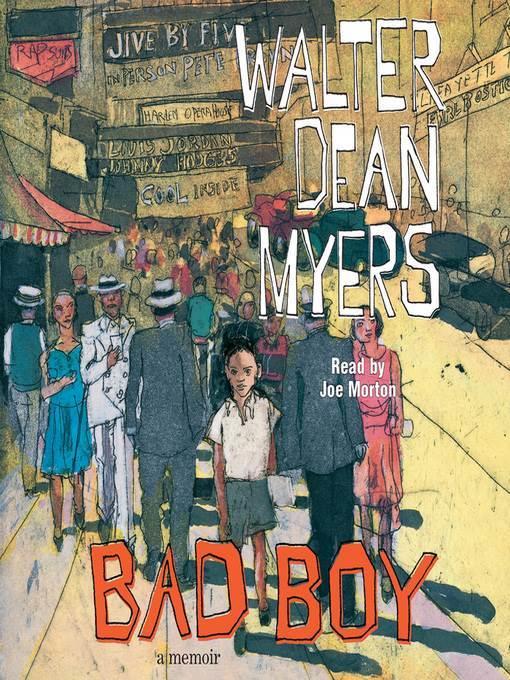
Bad Boy
A Memoir
فرمت کتاب
audiobook
تاریخ انتشار
2005
Lexile Score
970
Reading Level
5-7
ATOS
6.5
Interest Level
4-8(MG)
نویسنده
Joe Mortonناشر
HarperCollinsشابک
9780060839161
کتاب های مرتبط
- اطلاعات
- نقد و بررسی
- دیدگاه کاربران
نقد و بررسی

The world knows Myers as a gifted black writer. In BAD BOY, he tells us about growing up in Harlem in the 1950s. Though he was athletic and energetic, he also had a passion for reading. Secretly he haunted libraries, reading stories, poems, even philosophy as he hunted for his voice. That, even more than fighting and basketball, defined who he was. Acclaimed actor Joe Morton reads Myers's transition from "bad boy" to writer as if it were fiction. His voice is tight, sharp, at times attacking the reader, at times laughing at the ironies and complexities of growing up in Harlem. Above all, Morton makes sure we hear Myers's crisp prose. For young writers unsure of how or where to find their own voices, Myers points the way. P.E.F. (c) AudioFile 2001, Portland, Maine

July 9, 2001
Myers provides a sincere, friendly and unscripted introduction to this chronicle of his life, quickly engaging listeners. But Myers's vocal presence is too short-lived. Though Morton enthusiastically takes the baton and gives a competent reading, he can't match the obvious tone of familiarity the author has for his subject; the actor remains one step removed from the heartfelt revelations and introspective nature of the text. Myers's fans will likely overlook this shortcoming, happy to hear more about his childhood in 1940s and '50s Harlem. Myers describes his "coming up" as a series of scrapes and fights with neighborhood kids, teachers and gang toughs that earned him the bad boy title. A gifted student with advanced reading skills and a speech impediment, Myers early on turned to literature (and comic books) as an enlightening and stabilizing force in his life. He often found it difficult to adhere to the structure and discipline of the public school system and was continuously noted for poor conduct. His speech troubles encouraged teasing, making matters worse. By high school he rarely showed up for class, though kept on reading great books recommended by teachers and never gave up his aspirations to write. In the end, this warts-and-all story of a dream realized makes for an entertaining listen. Ages 12-up. (May)FYI:Simultaneously released with the HarperCollins hardcover.

November 1, 2001
Gr 9 Up-This recording of Walter Dean Myers' autobiography (HarperCollins, 2001) will engage those familiar with his fiction as well as those who have not read Motown and Didi (Viking, 1984), Fallen Angels (Scholastic, 1988), the Printz-winning Monster (HarperCollins, 2001), or any of his other children's and young adult literature. Actor Joe Morton reads smoothly and with subtle inflections that augment passages producing shared laughter or horror with the storyteller's view of events. Bad Boy recounts Myers' roots; his unofficial but permanent adoption as a toddler; how his mother planted and nurtured his life-long love of reading; the academic trials and victories he met in his Harlem grade school and accelerated junior high years; and the deleterious combination of speech impediment, depression, racism and alienation he experienced through his high school career. Eventually, he left school, without a diploma, to serve a stint in the army, followed by a decade of manual labor, before rediscovering his writer's voice and strengths. In addition to providing a chronology of Myers' personal growth and offering insights on the times, his autobiography is rich with references to the many books he found through teachers, librarians, and his own browsings. His introductions to such works as Camus' The Stranger are presented in a manner sure to entice teens to borrow from the Myers canon. With a bit of music to announce the beginning and end of each cassette's side, the production quality is befitting of this major new literary work.- Francisca Goldsmith, Berkeley Public Library, CA
Copyright 2001 School Library Journal, LLC Used with permission.

May 1, 2001
Myers paints a fascinating picture of his childhood growing up in Harlem in the 1940s, with an adult's benefit of hindsight. His previous 145th Street: Short Stories conveys a more vivid sense of day-to-day life on Harlem's streets, and readers learn little here of the effects of global events (such as WWII). What they will come away with is a sense of how a gifted young man, both intellectually and athletically, feels trapped in his own mind as he tries to find a place for himself in the world. Some insightful teachers make a huge difference in his life: a fifth-grade teacher who avails Walter of her classroom library; his sixth-grade teacher, Mr. Lasher, who recognizes the boy's leadership qualities; and a high school English teacher who spots him outside the guidance counselor's office and says, "Whatever happens, don't stop writing." Perhaps the most poignant and carefully crafted chapter involves the 16-year-old's thought process in response to his guidance counselor's question, "Do you like being black?" Throughout the volume, Myers candidly examines the complexities of being black in America, from his first exposure to slavery in a seventh grade American history class, to the painful realization in adolescence that his blond, blue-eyed best friend is invited to parties where Walter is not welcome. Other chapters sometimes feel haphazard (a foreshadowing of Walter's discovery that his father is illiterate, for example, undercuts a powerful later scene that explores this more fully). What emerges is a clear sense of how one young man's gifts separate him from his peers, causing him to stir up trouble in order to belong. Fortunately, this bad boy turned out to be a fine writer. Ages 12-up.

























دیدگاه کاربران